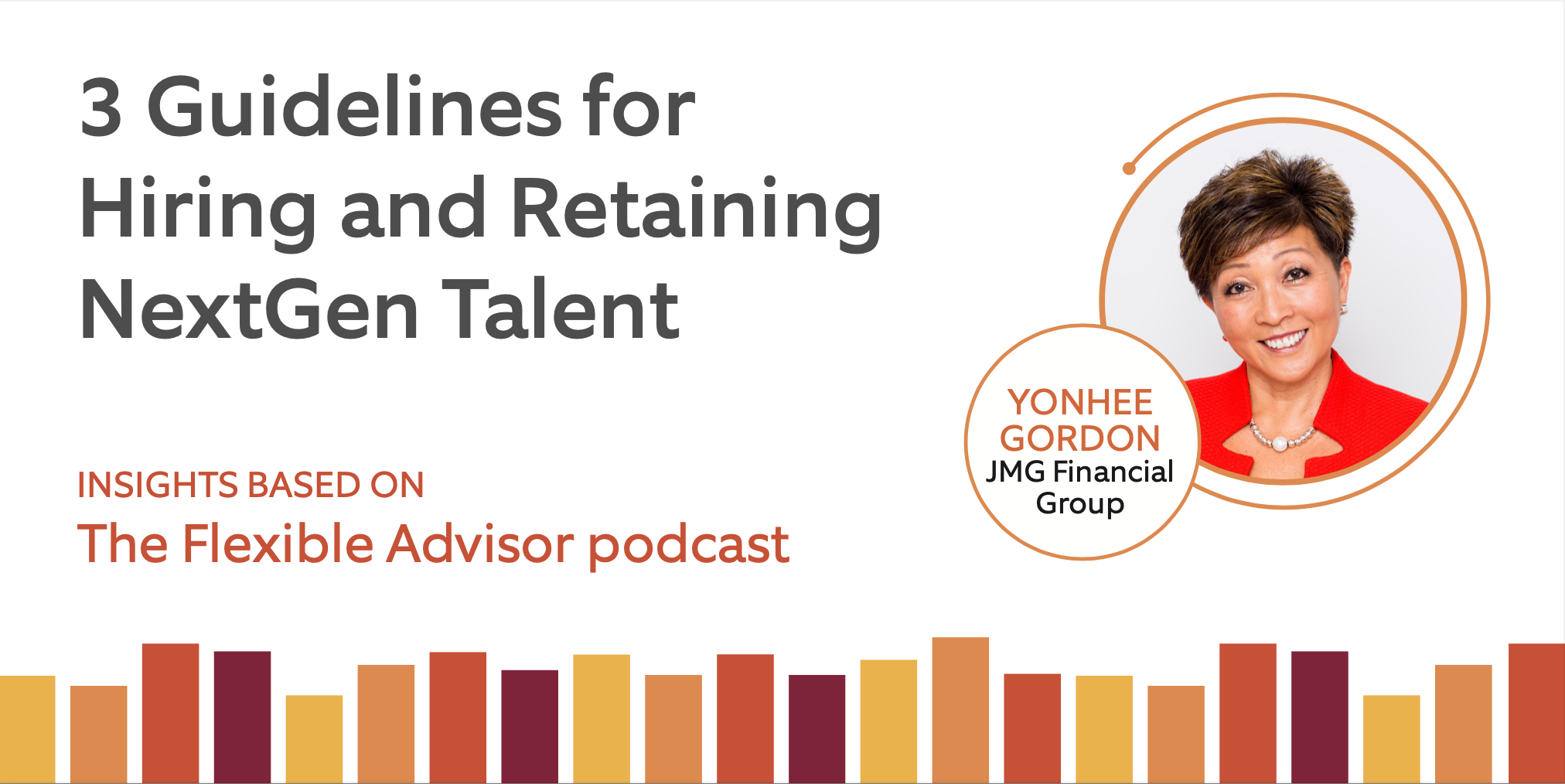The next generation of financial planners is smart, eager and in demand. How to get – and keep – the right young talent for your business.
A generational shift is underway in the financial planning industry. With the average age of advisors somewhere in the 50s, we stand to lose a significant number of senior advisors over the next decade. Meanwhile, the supply of new talent is diminishing. The challenge is three-fold: hiring younger candidates to support growth, succession planning and a broadening client base, while retaining young professionals in a highly competitive environment.
On a recent episode of The Flexible Advisor podcast, We spoke with Yonhee Gordon, Chief Operating Officer and Chief Marketing Officer at JMG Financial Group – recognized by InvestmentNews as a best place to work for financial advisors in 2018, 2019, 2020 and 2021. Yonhee shared these key elements of JMG’s success in attracting and retaining talent.
- Be intentional, not rigid. What does your business represent? What are the firm’s core values? How should this new hire support your culture? Clarity in these areas will help you frame a truly intentional hiring process.
The skills required for the role you are filling are probably straightforward and play a big part in your initial screening. But it’s the soft skills — listening, intuitive responses and innovative problem solving, to name a few — that warrant extra consideration before and during the interview process. “Often, advisors get into this business thinking of themselves as math teachers: 2 + 2 = 4,” says Gordon. “Over time, as they work their way through the business, they find they have become more like art teachers. They find that it's creativity — not necessarily the math game — that feeds their success.”
With that in mind, remember that many of the hard skills of this business can be taught. Soft skills may be in shorter supply among your traditional pool of candidates. Gordon suggests being open to the idea of meeting with candidates that don’t come from a financial background and individuals seeking a career change. Many of the skills acquired in another industry may be transferable, complementary and extremely valuable.
Check your preconceptions. Younger candidates may prove to be more focused, more savvy and more qualified than you might expect. As Gordon notes, “We have kids coming out of school already going through the curriculum for the CFP designation. In my experience, they are a lot smarter now than new candidates of 20-25 years ago.” These people are critical thinkers and problem solvers. They tend to bring with them a facility for technology, software, social media and innovative use of those tools that can represent tremendous value to your business and your clients. This is part of what is making the market so competitive.“We have kids coming out of school already going through the curriculum for the CFP designation. In my experience, they are a lot smarter now than new candidates of 20-25 years ago." — Yonhee Gordon
- Be methodical. When hiring for the long-term, Gordon suggests that a willingness to truly get to know prospective candidates can help lead to fewer surprises and better retention. Invest time to determine not only whether the candidate would be good for the firm, but whether the firm/role would be good for them.
“Our assessment process is twofold. First we want a candidate to see what it's really like to do the job. So we incorporate parts of what they would do in a particular role and time them. We need to see how they react to time management and deadlines, and how they approach problem solving with something that may be unfamiliar. That’s the analytical side. The other, equally important, side is understanding the candidate’s perspective and learning. We want to confirm that they have that internal core value of being a lifelong learner. For us, understanding the way they think is a very important element in assessing their potential alignment with our firm.” - Be transparent. Clear and honest communication between leadership and staff is not only a best practice, but arguably one of the most important elements of employee retention. For new hires, candidates should know precisely what is expected, and what areas may be most applicable or fulfilling for them given their skills and interests. “Anybody joining any firm should know exactly what they're getting into,” says Gordon. “More time needs to be spent upfront. They need to talk to many people at the firm so they get an idea of the culture. Even if it doesn't work out, give them some suggestions on how they can improve. Maybe give them some guidance, something you see in their skill set or their personality that they may not recognize; they may not know that there are opportunities and there are other areas in our industry that may be a better fit.”
Ideally, you want people to thrive personally and professionally as they contribute to your firm’s success. Being intentional, methodical and transparent can create a win-win: a staff that supports your culture and objectives, and an organization that fosters loyalty, commitment and productivity.
Access The FULL Podcast
Listen to our complete conversation with Yonhee Gordon by listening to the podcast embedded above.

